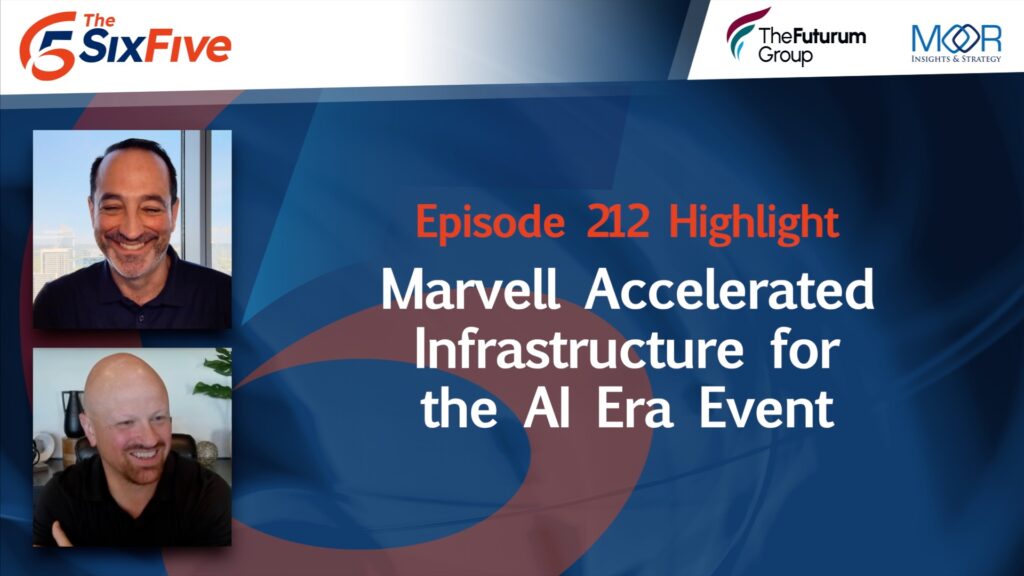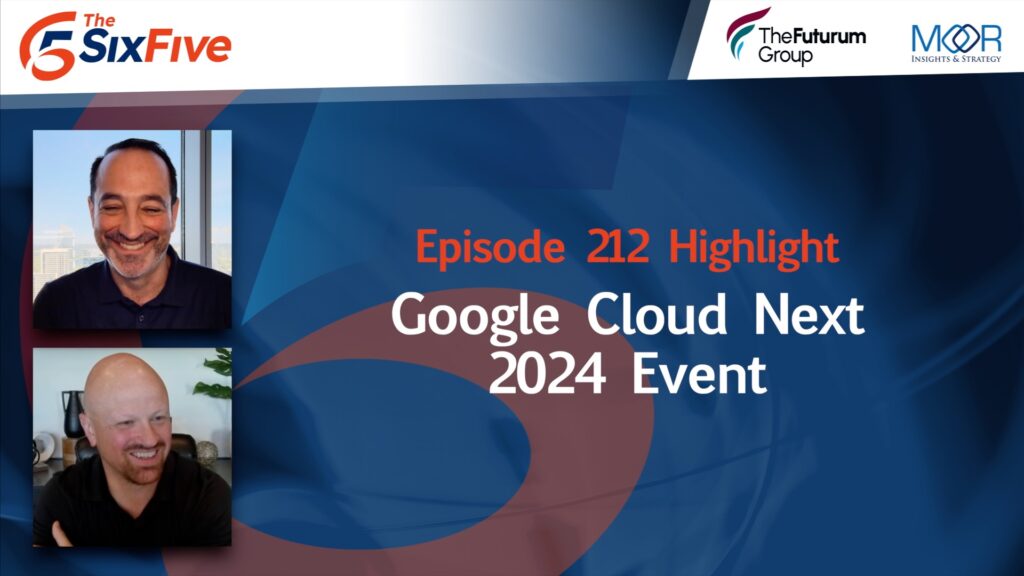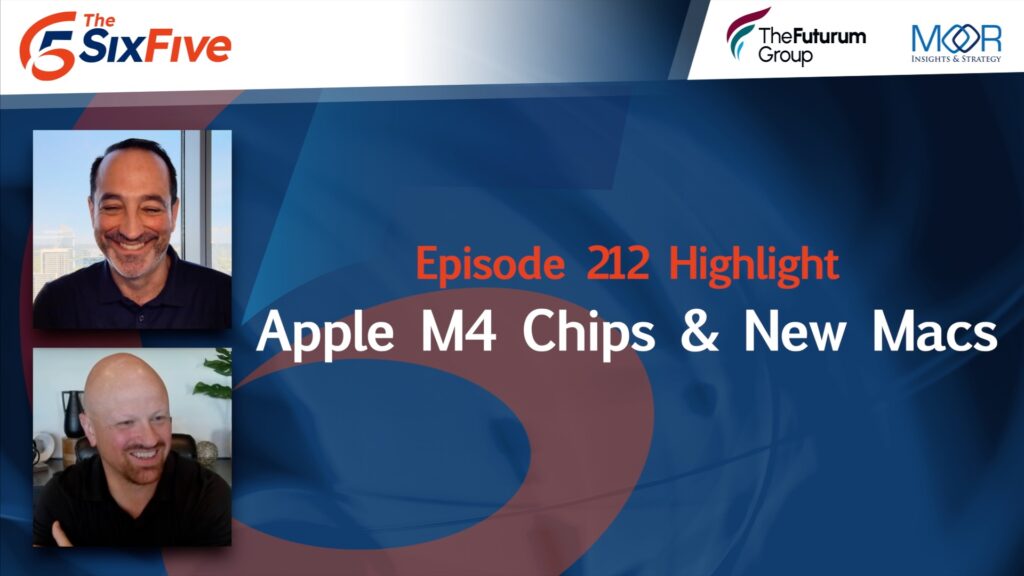In this episode of the Futurum Tech Webcast, Interview Series, our conversation today centers on an increasingly relevant topic: data, IoT and AI for Industry and how AI for industry is a game-changer.
As organizations connect their assets to the Internet of Things (IoT) and begin receiving and visualizing data, new needs emerge. They may want data scientists to implement machine learning or artificial intelligence (AI) to receive predictive analytics. But data scientists are in short supply, and organizations need new, better ways to run models. My guest today is Dr. Alexandr Sadovoy, Solution Architect for MindSphere products, Siemens, who joins me to discuss the challenges facing manufacturing organizations today, and what Siemens is doing, specifically as it relates to Siemens Industry Software, to help them achieve their goals.
Our conversation centered on the following:
- An overview of the kinds of companies that are using AI today, in particular, with the Internet of Things (IoT)
- An exploration of some of the primary uses for AI with IoT in the manufacturing industry.
- The connection between AI and machine learning and what the differences are.
- An overview of where Siemens Digital Industry Software thinks that AI is going, including edge analytics, and beyond.
- How organizations with limited technical knowledge and expertise in AI may perceive that trust is a huge barrier to entry, but there are tools out there to overcome these barriers.
- An overview of the Siemens MindSphere AI, an industrial IoT as a service solution, as well as a conversation around who can benefit from the AI functionality this solution provides.
MindSphere uses advanced analytics and AI to power IoT solutions from the edge to the cloud with data from connected products, plants and systems to optimize operations, create better quality products, and deploy new business models. Built on the Mendix application platform, MindSphere empowers customers, partners, and the Siemens organization to quickly build and integrate personalized IoT applications. If you would like to learn more about Siemens Mindsphere AI or any of the functionalities we talked about today, you can get more information here.
Also know that if we’ve piqued your interest, you can play around with MindSphere for free, with no download required, and no auto-charge or subscription, to see for yourself what the solution can do.
You can watch the video of our conversation here (and subscribe to our YouTube channel while you’re there):
Or listen to my interview on your favorite streaming platform here:
Don’t Miss An Episode – Subscribe Below:
Disclaimer: The Futurum Tech Webcast is for information and entertainment purposes only. Over the course of this webcast, we may talk about companies that are publicly traded and we may even reference that fact and their equity share price, but please do not take anything that we say as a recommendation about what you should do with your investment dollars. We are not investment advisors and we do not ask that you treat us as such.
Transcript:
Shelly Kramer: Hello, and welcome to The Futurum Tech Webcast. I’m your host, Shelly Kramer, principle analyst here at Futurum Research. And today we’re talking about an increasingly relevant topic, data IoT and AI for industry.
My guest today is Dr. Alexandr Sadovoy, who is s a solution architect for MindSphere products at Siemens Digital Industry Software. Before we get started just a little prelude. As organizations connect their assets to the internet of things, and they begin receiving and visualizing data, new needs emerge. They may want data scientists to implement machine learning or artificial intelligence to receive predictive analytics.
But the reality of it is that data scientists are in short supply and organizations need new and better ways to run their models. Alexandr joins me today to talk about the options that are facing organizations today and what Siemens is doing specifically as it relates to Siemens Industry Software to help organizations achieve their goals. So without further ado, Alexandr, welcome. It’s great to have you.
Alexandr Sadovoy: Thank you, Shelly. You are totally right. So really in the past, AI was, let’s say the topic for data scientists. So you need to read a lot of knowledge understanding mathematics and in all of the background of this. But right now, I mean, step by step in the stage that we can really move this through the manufacturing, through the productive organization to give it as a tools for engineers, not really having the deep knowledge in data science.
Shelly Kramer: Doing the heavy lifting for engineers, if you will.
Alexandr Sadovoy: Yes, that’s right. You can compare this, let’s say with speed element modeling. So in the past it was also things for mathematician, but right now you have a lengthy of software tools, let’s say to model products, to have the CAD Modeling and so on, process simulation and all it’s available, let’s say, for engineers.
Shelly Kramer: Absolutely. Absolutely. Before we dive in any more on that topic, I’d love to know a little bit about you. So would you tell us a little bit just about your own career path, how you ended up where you are today and what your role at Siemens is today?
Alexandr Sadovoy: Sure. So I started at Siemens 12 years ago. I studied University in the Ukraine in physics and I have a PhD in natural science and I had different positions within gas turbine engineering at Siemens, focusing on development and R&D in the manufacturing processes, and then step by step ran into direction of digitalization. And was responsible as a program manager for industrial IoT topics and digital metrology, let’s say practically getting closer to the IoT and implementing also machine learning and AI technique in manufacturing processes.
Shelly Kramer: So there’s not a lot you haven’t touched on this topic?
Alexandr Sadovoy: Yeah.
Shelly Kramer: And that’s awesome. That’s awesome. So most people have some familiarity with the concept of artificial intelligence, but let’s talk about what kinds of companies are using artificial intelligence today, especially or in particular with the internet of things.
Alexandr Sadovoy: So we can actually divide here companies into two groups. So first of all, the providers of the artificial intelligence technic, and right now the most of the cloud service providers let’s say provide also artificial intelligence tools. I would say, this is Google, IBM, Amazon Web Services and also Siemens have some tools providing this functionalities.
But it’s also important to have a user software. Particular application which are utilizing these service functions services, let’s say building some solutions for particular use cases for particular companies. And for now a lot of companies own solutions. They are quite locally, I mean, developed by data scientists, but there are some solutions which are able on the market, let’s say to provide out of the box functionalities for, let’s say, normal users.
Shelly Kramer: I think that out of the box functionality is becoming increasingly more attractive. I know you’re immersed in the space. I know a lot about the IoT and the manufacturing industry, but let’s talk a little bit, if we can, what some of the primary uses that we’re seeing with AI and the IoT in the manufacturing industry.
Alexandr Sadovoy: So maybe we can talk about AI in general. So this is practically the way how to use human-like way of thinking in the automatic processes, practically utilizing the AI method or in particular machine learning, we can really use similar methods by working with machine data, to making some kind of automatic decision to making some prediction based on some history data.
So it’s like human loans with step by step. I mean, learning more and more things, which here meets in history and the same works with the artificial intelligence methods. So practically the system learns from the past to predict something, what happens in the future and to make corresponding decisions.
And there are a lot of application in industry, practically, this is quite different what we had in the past. In the past, we had deterministic approach. You have to have process model. You have to understand deeply your process to be able to tell, okay, if your process works well or not.
But now without knowledge of the process just based on statistical methods implemented in the AI, in machine learning, you can really predict something that happens in the future. So practically you establish some function between system parameters, which enable you to connect your input data with your, somehow output data, which you would like to predict.
Shelly Kramer: Absolutely. And another thing, and not the very least of things that are important in this equation is when you have AI and machine learning working together, we’re able to see from a machine functionality and be proactive and predict problems rather than be reactive when it comes to problems.
And I think that that’s an important component here too, especially in industry, in manufacturing, we’re under greater stress probably the world over than we have been in a long time with supply chain issues and wars going on and all different kinds of things. So being able to predict problems and to remedy them before they actually become problems, I think is a big part of this that’s extremely valuable.
Alexandr Sadovoy: This is perfectly right. Exactly. So practically you apply these methods in real processes. I mean, there are typical examples. I mean, everybody knows about predictive maintenance. [inaudible] but at the end, what you do, you establish a relation between the input parameters which you get from the machine, from the environment, or maybe from the user.
You train your model with this input once you know what was in the past wrong. I mean, if the machine failed, if the machine got into some problem. So you train the model and you can predict this in the future. You can get some notification that machine starting to fail, let’s say, and to prevent this. It’s practically predictive and preventive approach.
Something what we can apply also not to maintenance, but to all process here, which for example predicted quality once you focused on your product. So always you want to reduce scrap rate. You want to ensure that you don’t produce any deficit products and you can also train your model with input data to predict some behavior of the product in the future.
Shelly Kramer: All incredibly valuable, I think, in today’s industrial operations. So let’s talk a little bit, if we can, Alexandr , will you give us an overview of where Siemens Digital Industry Software, where it is that you and your team think AI is going? And this, I think, to me is the most exciting part, it’s beyond things like predictive maintenance, which we can do today, but where are we going with this?
Alexandr Sadovoy: That’s right. So basically there are two directions via using the AI. So first of all, you can apply AI and machine learning algorithms locally on the machine. So called on the edge computing. So it means you really do some calculation ready to prediction on the machine, on the machine controller or on some, I would say hardware running close to machine, let’s say, real time. And there are some solutions already available for the edge analytics.
And another approach is to use a cloud-based solutions. So practically you send the data from the machine, maybe pre-processed in the edge, but you send some aggregated data to the cloud-based environment. And Siemens developed the cloud so-called mind scale. And in mind scale it’s possible to store this data and to deploy the application, which can work with this data in the automatic mode, let’s say to deploy the machine learning models, let’s say to create, let’s say to train model and to create predictions, to be consumed by user applications.
And this is something what Siemens is doing here. There are some dedicated solution already available, especially in MindSphere. And let’s say to work with machine data to predict some trends in so-called time series data, which coming out of machine. And there are also some other solutions let’s say to deploy machine learning, for example, for prediction of the quality results based on machine data. This is also something going to be implemented.
Shelly Kramer: So specific to Siemens’ MindSphere AI, I think that to me, part of the beauty of technology solutions in general, and this solution in particular is that what it allows is for organizations with limited technical knowledge and expertise in AI. And a lot of times there are issues in terms of trust can often be a barrier to entry.
I’m looking at making a financial investment. I’m not 100% sure how this is going to go. This is where I also say my team and I talk about this often, I think the formula for success in business today is really the ability that the strength of the partnerships that you are able to forge. And I think we see that more and more, but having a trusted vendor partner who can help deliver solutions like this, I think is part of the key to success.
That said, for someone who’s thinking about doing something like this, I know that trust is a barrier to entry. So let’s talk about some of the ways or some of the tools that are available to help overcome those barriers or that resistance. What have you seen?
Alexandr Sadovoy: So actually with MindSphere we have quite higher level of flexibility. So there is some solutions so-called predictive analytics service which enables data scientists, let’s say, to create own model, really to implement own script, the whole program and practically around on MindSphere.
But from the other hand, you are right, to reduce this entry difficulties for the companies. If you don’t have data scientists expert, then there are some out of box solutions. For example, so-called AI for everyone solution, it’s a trend analyzes software, which really enables this quite simple and user-friendly interface enables let’s say, to create models and to build trends let’s say of type series data, which is already helpful let’s say for prediction of machine parameters.
For example, if you track motor temperature or some other parameters in real time where you can actually based on previous results to predict what happens in the future. And another option is also for example, something [inaudible] and I will be responsible for these to develop production quality application which is focused on prediction as a quality result based on machine data.
So practically you analyze the time series data, I mean, from multiple parameters, ready to the machine, you aggregate the data in the needed form. And you capture also the quality results. For example, if you do some measurement, I don’t know if you drill holes with a machine tool and want to measure diameter, the diameter would do the quality output, and you want to keep this parameter in some tolerance.
And there is a way to use machine learning to predict final results based on the machine data. Something what we’ll do in automatic mode with a dedicated application. So practically to let user not really concentrate on mathematics, not only what happens in the background, but just select data and just to get their prediction results.
Shelly Kramer: So it’s an easy button?
Alexandr Sadovoy: Yeah. Exactly.
Shelly Kramer: I don’t know about you, but that’s what I’m looking for, is an easy button. So you’ve given some great examples. I always like to ask, you don’t have to name a customer, of course, but do you have any customer success stories or use case examples? I find that sometimes it helps to know that company X, Y, Z had these challenges, or did this, or whatever and this is where they are this is the result. Anything like that you can share with us?
Alexandr Sadovoy: Sure. So we are running now let’s say some visibility studies for proof of concept with siemens factories. I can tell, I would not name this company, but this electronics company to produce some chips and electronic parts, and there is quite successful results, I mean, for prediction or some parameters or classification, for example, if you look at the quality, sometimes you don’t need to predict the results, but you need to classify either part good or bad, let’s say true or false.
And there’s also part of machine learning. And we have quite good results, let’s say with some particular processes. And to be honest, with machine learning, it’s even impossible to develop some software without real data, without real proof of content. Because this is not deterministic anymore, you have really to work with real data to ensure that your algorithm, your model really works.
Shelly Kramer: Well, and lots of real data.
Alexandr Sadovoy: For sure.
Shelly Kramer: I think that’s the key to success with machine learning, is taking these mountains of data that we generate every day and being able to put them to use for us. So you’ve talked with us a little bit about Siemens MindSphere AI and are there any other points that you want to make either in terms of benefits of the solution that we have haven’t yet talked about or more thoughts on who might benefit from this AI functionality? I know we talked about it a little bit. So if there’s something that we haven’t hit on and would love to hear from you on that front.
Alexandr Sadovoy: Sure. So definitely, I mean the business case, or this kind of applications related to process automation, it means you do multiple process or you do even decision making in the automatic mode. It means the particular engineers. First of all, get some more insight in the real processes because they understand processes better.
Once they build a machine learning model, this is one advantage. But in other advantage, the engineer get some suggestion or even get some decision from the automatic system. Let’s say how the system behaves or what output is expected. And definitely there is a lot advantages. The machine stops, you can prevent the machine failures, you can prevent the damaged parts and this all actually the benefit for the company.
Shelly Kramer: Absolutely.
Alexandr Sadovoy: But I would also tag this topic of data. Definitely, we are talking about big data, but it’s also important the quality of the data. It means for machine learning, it’s not a magic, so at the end you should have in your input data, the over information to be able to predict the output.
If this information is not there, so it’s no chance let’s say even for machine learning or artificial intelligence to give some good results. It means it’s really important to concentrate on getting exactly necessary data which describe your system, let’s say, to enable good output at the end from the machine learning algorithm. And this is something very important, what we learn now from all visibility studies and from all, let’s say, implementation stories, that data quality is very important.
Shelly Kramer: Data quality is indeed very important. I think that’s a fundamental business principle. What a fascinating conversation. I know enough about the Siemens team and about the MindSphere solution and the MindSphere team.
I think one of the coolest things is that you are there every step, your team is there every step of the way with your customers who are implementing this. And I think that that is a huge benefit as well. I think that today what customers are looking for is not somebody to just sell me a solution and walk away.
And so I think, to me, that’s one of the big value props is that you and your team are able to bring all of the expertise in all of the learnings that you have across a gigantic customer base and apply them for me, no matter what my particular situation is or how large or small my company is. Is that a fair assessment of part of the value proposition?
Alexandr Sadovoy: Yes, that’s right. For sure. I mean, cooperation with the customers, the most important thing. Because you have to ensure that you get the right data, as I mentioned, and you have to ensure that your model works in the pilot phase and once it’s shown that then works quite automatically, but in the very beginning or in the implementation phase, sure.
Shelly Kramer: Absolutely. I mean, that’s what I’m looking for when I buy a technology solution. So I have always thought that’s really a great part of this value proposition. Well, Alexandr , it has been a fantastic conversation for our viewing or our listening audience. I will tell you that we have barely hit the tip of the iceberg in terms of the many terrific things that Siemens MindSphere AI can do and is doing in the marketplace right now.
And so if you’d like to learn more about that or any of the functionalities that we talked about today, we’ll be sure and include links in our show notes. I will include a link to Alexandr ‘s LinkedIn profiles, so that can find him there if you want to reach out to him and have any questions about that. But that’s going to wrap up our conversation today. Alexandr Sadovoy:oy from Siemens, thank you so much for spending time with me today. It’s been a terrific conversation. I really appreciated it.
Alexandr Sadovoy: Thank you very much for you, for the opportunity to present the MindSphere solutions and let’s say AI trends we are working with.
Shelly Kramer: Absolutely. Well, I think that what you and your team are doing with MindSphere is incredibly exciting. And I know there’s more innovation to come and I look forward to our next conversation.
Alexandr Sadovoy: Thank you very much.
Author Information
Shelly Kramer is a Principal Analyst and Founding Partner at Futurum Research. A serial entrepreneur with a technology centric focus, she has worked alongside some of the world’s largest brands to embrace disruption and spur innovation, understand and address the realities of the connected customer, and help navigate the process of digital transformation. She brings 20 years' experience as a brand strategist to her work at Futurum, and has deep experience helping global companies with marketing challenges, GTM strategies, messaging development, and driving strategy and digital transformation for B2B brands across multiple verticals. Shelly's coverage areas include Collaboration/CX/SaaS, platforms, ESG, and Cybersecurity, as well as topics and trends related to the Future of Work, the transformation of the workplace and how people and technology are driving that transformation. A transplanted New Yorker, she has learned to love life in the Midwest, and has firsthand experience that some of the most innovative minds and most successful companies in the world also happen to live in “flyover country.”












